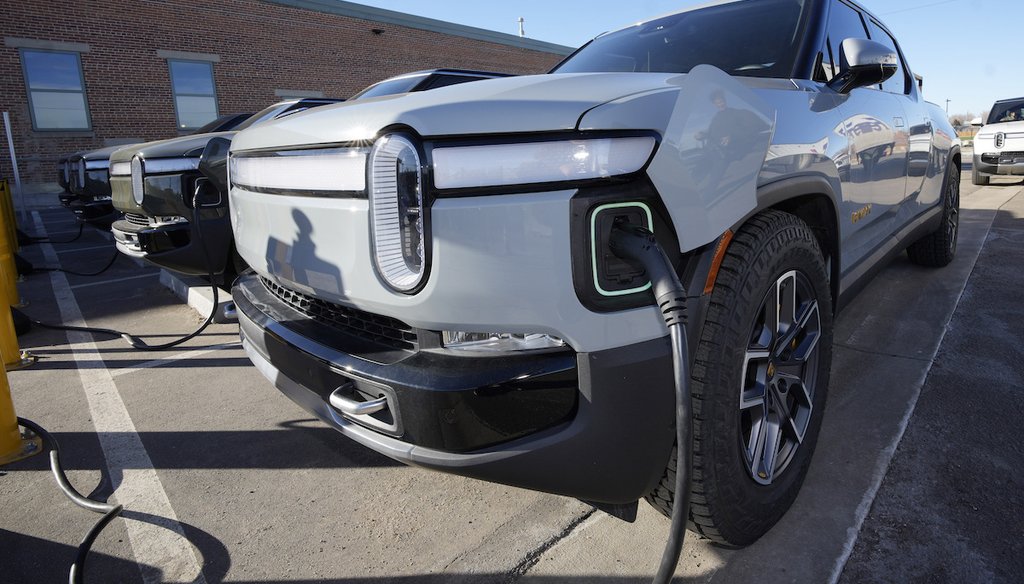Stand up for the facts!
Our only agenda is to publish the truth so you can be an informed participant in democracy.
We need your help.
I would like to contribute

A 2023 Rivian R1T electric pickup truck being charged. (AP)
If Your Time is short
-
Electric vehicles generally are heavier than gasoline-powered ones, but the extra weight doesn’t damage roads nearly as much as semitrucks do.
-
EVs don’t pay gas taxes, the biggest revenue source for road maintenance and improvements, so states are imposing fees on these vehicles.
-
Experts said EVs’ additional weight has little impact on infrastructure but, like other heavier vehicles, can create more danger in collisions.
Republican presidential candidate Nikki Haley suggested at a June 4 CNN town hall that the nation’s infrastructure isn’t ready for eco-friendly transportation.
"Electric vehicles are so heavy that our roads and bridges aren’t capable of handling that," Haley, the former South Carolina governor, said.
Three days later, Sen. Marco Rubio, R-Fla., raised the same issue. He sent a letter to the Securities and Exchange Commission asking the agency to investigate, for investors’ benefit, the "potentially disastrous implications of widespread EV adoption for the country’s transportation infrastructure."
Electric vehicles generally weigh more than gasoline-powered cars and EV owners don’t pay gasoline taxes, which are states’ largest source of revenue for roads and road maintenance. Motor fuel taxes comprise the largest source of states’ transportation fund revenues, at 38.4%, the National Association of State Budget Officers reported.
Haley’s campaign staff pointed us to a related article when contacted for comment. Rubio did not respond to a request for comment.
But infrastructure experts said that by far, more damage to roads and bridges is caused by weightier vehicles such as semitrucks. At the same time, EVs’ extra weight can create more danger in collisions.
And although electric vehicle owners pay no gasoline taxes, states have responded by imposing other fees on EVs, to offset the revenue loss and pay for road improvements.
Growing number of EVs on U.S. roads
Motorists drove 3 million electric vehicles on U.S. roads in 2022, according to the Alliance for Automotive Innovation, an industry trade group. That’s 1.1% of all vehicles.
But EV use is increasing, spurred by federal and state policies.
Electric vehicles comprised 7% of all new vehicle sales in 2022, up from 4.3% in 2021 and 2.3%in 2020, according to the auto alliance.
The Biden administration’s goal is for electric vehicles to account for 67% of new passenger-car sales by 2032, a nearly tenfold increase from today. The bipartisan infrastructure bill Biden signed in 2021 includes investments in electric vehicle charging stations. Federal tax credits and state rebates and tax deductions are offered for electric vehicle purchases.
Batteries make EVs heavier than gas-powered vehicles
Civil and environmental engineering professor Kevin Heaslip, director of the University of Tennessee’s Center for Transportation Research, said EVs often weigh 30% more than gas-powered vehicles.
The main reason is the weight of their batteries, which can add hundreds of pounds or more.
This sampling shows a comparison between 2023 models and weights, according to Kelley Blue Book:
Experts said EVs’ additional weight has little impact on infrastructure, but can create more danger in collisions.
Heavy trucks damage roads
Heaslip and professional engineer Mark Gottlieb, associate director of the University of Wisconsin-Milwaukee’s Institute for Physical Infrastructure and Transportation, said heavy trucks cause the vast majority of damage on U.S. roadways.
"Load-related damage to pavement and bridges is caused almost exclusively by heavy trucks. The deterioration from a single large truck can easily be equal to that of thousands of autos," Gottlieb said. "The contribution from autos and light trucks is insignificant. It makes no difference if they are EV or internal combustion."
Just think of how much heavier, and how many more wheels, are on commercial trucks.
A semitruck with eight axles weighing 80,000 pounds does 2,500 times more road damage than a two-axled, 4,000-pound sedan, according to the American Institute of Physics.
For decades, engineers have agreed that heavy trucks are much more responsible than passenger vehicles for creating potholes and wearing down roadways, requiring more frequent repaving.
Although agreeing that commercial trucks by far do the most damage to infrastructure, some experts expressed concern about EVs’ extra weight.
Civil engineer K. N. Gunalan, past president of the American Society of Civil Engineers, said some rural roads and bridges might not be designed for heavier passenger vehicles, including electric ones.
Jim McDonnell, director of engineering for the American Association of State Highway and Transportation Officials, agreed with Gunalan that there is worry about the heaviest EVs.
"Additional weight at the higher ranges would likely lead to shorter lifespans for bridges, more frequent replacements and more frequent roadway repairs," he said.
States adding new revenue streams for roads
Before the emergence of electric vehicles, other factors were already cutting into the gas revenue. Federal fuel taxes haven’t increased since 1993; the federal tax and most state gas taxes don’t rise with inflation; and gas-powered vehicles have become more fuel efficient, requiring less gas and yielding lower tax payments.
Given those factors and electric vehicles’ increasing popularity, 33 states since 2013 have raised their fuel taxes and some have added other types of revenue for roads, according to the budget officers association.
The Eno Center for Transportation, a Washington, D.C.-based nonprofit research group, in 2022 launched a project to examine replacing gasoline taxes with fees based on the number of miles motorists drive. The federal 2021 infrastructure law requires that the Transportation Department do a pilot project on a so-called vehicle miles traveled fee.
EVs are also targeted for special fees.
Iowa, Kentucky, Oklahoma and Pennsylvania charge fees at EV charging stations. Thirty states have imposed higher annual registration fees on electric and hybrid vehicles, which use a combination of gas and electricity. They range from $50 in Colorado, South Dakota and Hawaii to $225 in Washington state, according to the National Conference of State Legislatures.
"We’re not opposed to states adding fees to help cover those gas taxes, but we just don’t want it to be punitive," said Elaine Borseth, president of the Electric Vehicle Association, a California nonprofit that advocates for the adoption of EVs.
Heaslip said states’ EV fees are not making up for the revenue that would be generated by gas taxes from gas-powered versions of those same vehicles.
States have continued raising fees on electric vehicles in recent months:
-
In April, Republican Tennessee Gov. Bill Lee signed a law that raises the state’s annual EV fee to $274 by 2027. It’s the highest in the U.S. and matches what the average Tennessee motorist using a gas-powered vehicle spends in a year on gas taxes, Heaslip said.
-
In May, GOP Texas Gov. Greg Abbott signed a law that creates a one-time fee of $400 to register a new electric vehicle and raises the annual registration to $200 for EVs.
-
In June, the Republican-controlled Wisconsin Legislature’s budget committee approved raising to $175 from $100 the annual vehicle registration fee for electric vehicles.
EVs more dangerous on impact
Being struck by a vehicle that is 1,000 pounds heavier than the one you’re riding in increases the chance of death by 47%, according to a study by the National Bureau of Economic Research.
Electric vehicles tend to have a lower center of gravity than conventional vehicles, however, making them more stable and less likely to roll over, according to the Energy Department.
But electric vehicles’ extra weight has raised worries that they make collisions more dangerous.
"Heavier vehicles are less deadly for the people in the heavier vehicle, but more deadly for those in a lighter vehicle," Heaslip said.
Motorists’ preference for heavier vehicles, both electric and gas-powered, raises safety risks, especially for pedestrians and bicyclists, said David Orr, director of Cornell University’s Local Roads Program. But speed and distracted or impaired driving are larger factors in serious crashes and deaths, he said.
Options are being developed to reduce EV battery weights, said Venkatesh Prasad, senior vice president of research of the Michigan-based Center for Automotive Research.
A new design that’s being developed would integrate the battery into the car’s structure, making it lighter.
RELATED: New electric vehicle tax credit rules aim to reduce dependence on China, but present new obstacles
RELATED: Joe Biden is pushing for more electric cars. Will there be enough charging stations?
RELATED: Batteries don’t make electric vehicles more likely to catch fire than gasoline-powered cars
RELATED: For certain car models, it’s more expensive to drive electric, but that’s not the whole story
Our Sources
Kelley Blue Book, "Car Research," accessed June 10, 2023
National Conference of State Legislatures, "Special Fees on Plug-In Hybrid and Electric Vehicles," March 27, 2023
Associated Press, "Lawmakers vote to raise electric vehicle fees," June 14, 2023
National Bureau of Economic Research, "Pounds that Kill: The External Costs of Vehicle Weight," June 2011
YouTube, "Nikki Haley June 4 CNN Town Hall (1:00:10)," June 5, 2023
CNN, "Why electric cars are so much heavier than regular cars," June 7, 2021
Email, Robert Puentes, president and CEO of the Eno Center for Transportation, June 15, 2023
Capital One Auto Navigator, "Will Heavy EVs Destroy America's Roads?", April 26, 2022
Forbes, "Electric Vehicles And The Impact On Infrastructure," Dec. 29, 2022
CNet, "America's new weight problem: Electric cars," Jan. 28, 2022
Email, Nikki Haley campaign spokesperson Ken Farnaso, June 15, 2023
The Manual, "These are all of the states charging EV owners extra fees just for going electric," May 31, 2023
Governing, "Too Big for The Road," Aug. 16, 2010
General Accounting Office, "Truck Weight and Its Effect on Highways," July 23, 1979
Loyola Consumer Law Review, "Declining Motor Fuel Tax Revenue Due To Electric Vehicles and Increased Fuel Efficiency," March 4, 2022
Alliance for Automotive Innovation, "Get Connected: Electric Vehicle Quarterly Report 2022 (Q4)," March 23, 2023
CBS News, "As electric vehicles become more common, experts worry they could pose a safety risk for other drivers," June 13, 2023
KXAN-TV, "Texas to charge EV owners $400 to register vehicles, $200 every year," May 20, 2023
Email, Brian Sigritz, director of state fiscal studies, National Association of State Budget Officers, June 12, 2023
Eno Center for Transportation, "Eno Launches New Research Initiative to Help Define Parameters for a National VMT Fee Pilot," Sept. 16, 2022
National Association of State Budget Officers, "States Consider New Transportation Funding Options," March 13, 2023
Energy Department, "Maintenance and Safety of Electric Vehicles," accessed June 14, 2023
Email, Kevin Heaslip, civil and environmental engineering professor and director of the Center for Transportation Research, University of Tennessee, June 12, 2023
Inside Science, "How Much Damage Do Heavy Trucks Do to Our Roads?", Oct. 12, 2020
Insurance Institute for Highway Safety, "Vehicle size and weight," July 2022
Interview, Elaine Borseth, Electric Vehicle Association president, June 13, 2023
Code of Arkansas, "A.C.A. § 27-14-614," accessed June 14, 2023
Axios, "EVs are much heavier than gas vehicles, and that's posing safety problems," April 28, 2023
Sen. Marco Rubio, letter to U.S. Securities and Exchange Commission, June 7, 2023
Email, professional engineer Mark Gottlieb, associate director, University of Wisconsin-Milwaukee Institute for Physical Infrastructure and Transportation, June 15, 2023
Email, American Society of Civil Engineers spokesperson Rob Marmet, June 15, 2023
Email, American Association of State Highway and Transportation Officials spokesperson Allyson Freedman, June 15, 2023
Email, David Orr, director and senior engineer, Cornell University Local Roads Program, June 16, 2023
Email, Venkatesh Prasad, senior vice president of research and chief innovation officer, Center for Automotive Research, June 16, 2023


























